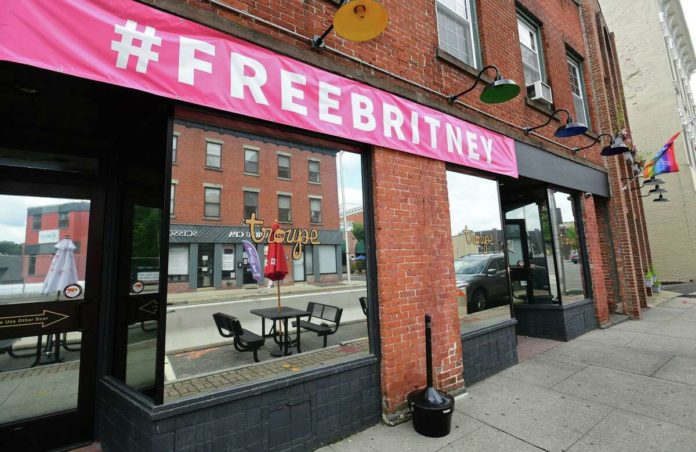If you start at Enigma, just off the corner of Central Avenue and 11th Street in Florida’s St. Petersburg — with its spotlights casting a two-story rainbow on a Spanish-style stucco façade — and head west about a half-a-mile, you’ll hit Cocktail. Then it’s Mixer’s at Old Key West a block further. The Garage, Punky’s and Lucky Star Lounge follow in near rapid succession. Head a few Blocks up and there’s Our Bar.
With legislation like the “Don’t Say Gay” bill and last year’s transgender girls sports ban, the Sunshine State has a shadowy reputation for how it treats the LGBTQ community. Yet in a one square-mile radius of one city in Florida, you’ll find about just as many gay bars as you will in the entire state of Connecticut.
Turns out, that might be a good thing.
David Kleman has owned Partners, a gay bar in New Haven, for about 25 years. It’s been around for almost 50.
But back in the ’80s, Kleman worked the bar and has, for more than 40 years, watched how the nightlife culture for the LGBTQ community has shifted in Connecticut and around the country. Kleman said he remembers a time when gay bars were a refuge for a marginalized community that was often physically and verbally assaulted.
“Years ago, if you were gay you just wouldn’t walk into some place, so you would go to a gay bar or a leather party or a drag show,” Kleman said. “We get married now and have kids. We’ve been integrated in society very well.”

Troupe 429 bar Friday, July 30, 2021, in Norwalk displayed a “#FreeBritney” banner.
Erik Trautmann / Hearst Connecticut Media
According to Out Leadership, an LBGTQ business network, Connecticut ranks second in its LGBTQ+ Business Climate Index of LGBTQ friendly states.
In the ’80s, Kleman said, Partners clientele was almost entirely gay. Now he said there’s a near-even split. He said that’s because the LGBTQ community isn’t as marginalized in Connecticut as it is in other parts of the country.
“Be careful what you wish for,” Kleman said with a laugh. “In Connecticut gay people are comfortable going everywhere. Gay people are more comfortable walking into any club or any bar.”
And he’s not alone. Titus Abad, a 29-year-old gay man from New London County, said gay bars in Connecticut are somewhat of a dying breed because mainstream culture has become more accepting of the community. Which, he said, was always the goal.
“There’s a question of do we really need the ‘gay bars’ anymore,” Abad said. “We have more rights than we used to. And we had to fight for them. The generations before us paved the way. We don’t need the gay bars as much because we’re not physically threatened the way we used to be — though it still happens. We are equal and that’s what gay bars have always been about. But now other bars are doing that as well.”

Thousands attended PrideFEST Saturday in Middletown. The event is one of Connecticut’s largest Pride celebrations.
Perceptions Photography / Contributed photo
Kleman said many of New Haven’s nightlife establishments are now owned by people in the LGBTQ Community and the tolerance for intolerance is nearly non-existent within the nightlife scene.
“The thing is,” Kleman said, “straight people are more comfortable with us too. When more people come out, it makes it easier for people to understand the different communities. [The nightlife scene] is good right now. People are accepted everywhere. Business is good and people are out. I don’t we need to see much of a change. But to stay consistent as things around are a little unsettling.”
Kleman said change for the worse is “on a lot of gay people’s minds” following Supreme Court Justice Clarence Thomas’ concurring opinion in a ruling that overturned the abortion and privacy protections of the Roe v. Wade decision.
Thomas said the court “should reconsider all of this Court’s substantive due process precedents, including Griswold, Lawrence, and Obergefell.” Those are key cases that established protections for things like a couple’s right to access contraception, same-sex intimacy and same-sex marriage.
That, Abad said, is part of why gay bars still hold an important place in an incrementally accepting society. Abad grew up in Groton, one of Connecticut’s smaller cities. He came out at 18. Being able to have a known safe place where he was surrounded by likeminded individuals or those who had walked similar paths, was crucial.

The city of Middletown officially kicked off Pride Month Wednesday morning at the Pride Progress crosswalk on Main Street.
Cassandra Day / Hearst Connecticut Media
“I struggled with it (coming out) in high school. Once I did, though, I felt pretty welcome,” Abad said. “But it took time. I was always able to find solace and community at local coffee shops in downtown Mystic or The Brass Rail (a now-closed gay bar) in New London. It was imperative for me to have that.”
While Kleman says “old-time gay bars” like Partners are still around, LGBTQ inclusion has become part of the bar and restaurant scene. In Norwalk, Troupe 429 offers near daily drag shows at the gay-owned establishment. Owner Casey Fitzpatrick credits shows like “Ru Paul’s Drag Race” with propeling the scene forward while allowing people to better understand and respect the art of drag.
As for the future, Fitzpatrick wants to see more of that inclusivity.
“I grew up in Connecticut, and plan to raise my family here. I’d love to see more small businesses owned by queer people,” Fitzpatrick said. “The individual towns of Connecticut should support and encourage this, and there needs to be more programs to help our community.”
Abad agrees. He said New London has embraced drag as well with performances by the Sea Queens at Port of Call in Mystic or drag shows at Dockside in New London.
“Seeing that happening in Mystic, seeing places open and have drag performances is so exciting,” Abad said. “I’ve always said Mystic needed two things — a tattoo shop and drag or a gay bar. Now it’s like more places are waking up where they don’t necessarily need a gay bar, but these drag shows are popping up.”
Still, Abad worries that people will view the LGBTQ community as a monolith without accepting the intersectionality of the many smaller communities that make its whole. He hopes to see more LGBTQ events and inclusion beyond drag shows.
He said as long as rights remain under attack, and even if Connecticut can be safe place for many, efforts at inclusion and understanding should abound.
“Just because someone might be transgender doesn’t mean they love drag,” Abad said. “People get boxed into this idea of what gay is and what trans is. I want there to be more businesses willing to showcase and have outreach, poetry readings, bands, anything our towns and government can do. Even a little helps.”
Below, check out five gay bars and drag clubs in Connecticut.
Troupe429
Norwalk

Troupe429 on Wall Street, Wednesday, March 18, 2020, in Norwalk, Conn.
Erik Trautmann / Hearst Connecticut Media
For the past five years, Casey Fitzpatrick and Nicholas Ruiz have owned and operated Troupe429, a gay-owned bar in Norwalk that puts on drag shows almost daily.
The bar hosts resident drag queens like Sienna Rose and Robin Fierce who regularly perform as well as special guests such as “RuPaul’s Drag Race” stars Tina Burner, Aquaria and Miz Cracker.
Outside of hosting resident drag queens who regularly perform, the bar packs “troupers” in for a number of prominent stars in the national community, such as “RuPaul’s Drag Race” icons Tina Burner, Aquaria and Miz Cracker.
Anyone looking to celebrate Pride beyond June in Norwalk need only step into Troupe429, where Fitzpatrick promises “lots of drag shows, rainbows and gay good times.”
Troupe429 is located 3 Wall St. in Norwalk. Tuesday-Thursday: 6 p.m.-1 a.m., Friday-Saturday: 6 p.m., Sunday 6 p.m.-1 a.m.
Partners Cafe
New Haven
Open seven days a week, Partners Cafe has been serving patrons in New Haven since 1974.
The bar and nightclub has specials every day of the week including “Two for Tuesdays” and “Strobelight Saturdays.” Partners also hosts a number of special events and themed evenings throughout the month.
Partners Cafe is located at 365 Crown St. in New Haven. Sunday-Thursday: 8 p.m.-1 a.m., Friday-Saturday: 8 p.m.-2 a.m.
Trevi Lounge
Fairfield

Drag performers Tiana Maxim Rose, of New Haven, at left, and Lucia Virginity, of Thomaston, take selfies. before the start of the Drag Race for Governor fundraiser at Trevi Lounge in Fairfield, Conn., on Friday, Aug. 10, 2018.
Christian Abraham / Hearst Connecticut Media
Named one of the best LGBTQ+ bars in the U.S. by Tasting Table, Trevi Lounge is an LGBTQ+ bar and safe space in Fairfield.
The space hosts a number of weekly events including karaoke on Tuesdays and Thursdays, and Wacky Wednesday, “Fairfield County’s only weekly LGBTQ+ open stage.” Trevi Lounge has also hosted a number of “Hit Play” themed nights in recent months including shows dedicated to Lady Gaga, Rihanna and Beyoncé.
Trevi Lounge is located at 548 Kings Highway Cutoff in Fairfield. Tuesday-Thursday: 7 p.m.-1 a.m., Friday-Saturday: 7 p.m.-2 p.m., Sunday: 7 p.m.- 1a.m.
168 York Street Cafe
New Haven
One of the oldest gay bars in the state, 168 York Street Cafe is nestled into brownstone building near the Yale campus.
168 York Street Cafe hosts drag events, dance parties and even serves up a variety of dishes, including BBQ on Sundays during the summer.
The cafe is also known for its charitable efforts, donating proceeds to local organizations at the door on Thursdays and Sundays, which it has done for over the past 20 years, according to its website.
168 York Street Cafe is located at 168 York St. in New Haven. Tuesday: 3 p.m.-11 p.m. Wednesday-Thursday: 3 p.m.-12 a.m. Friday: 3 p.m-1 a.m. Saturday-Sunday: 5 p.m.-2 a.m.
Chez Est
Hartford
Biling itself as “Hartford’s only LGBTQ+ restaurant, bar and cabaret,” Chez Est has been a staple in the community for more than 45 years. Chez Est regularly hosts drag cabaret events and has its own “House of Legends,” which is comprised of notable LGBTQ+ figures from the area.
Outside of hosting weekly cabaret and karaoke nights, Chez Est boasts a full bar and kitchen brimming with culinary options that range from baked eggplant parmesan to carnitas pork tacos.
Chez Est is located at 458 Wethersfield Avenue, Hartford. Wednesday-Thursday: 5 p.m.-1 a.m., Friday-Saturday: 5 p.m.-2 a.m., Sunday: 5 p.m.-11 p.m. Chez Est is 21+.









